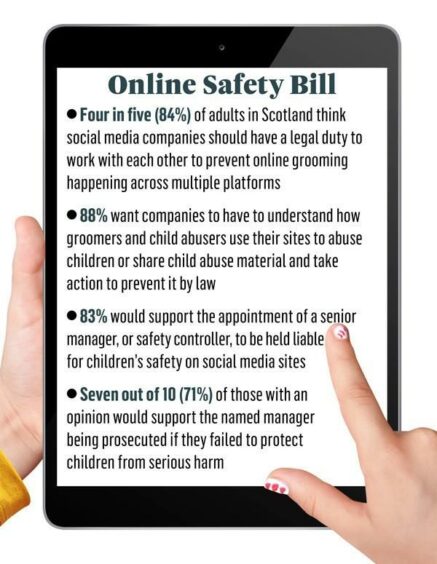A new survey shows many Scots want tech companies to take greater responsibility in keeping kids safe online.
YouGov asked two and a half thousand adults for their views, including 212 adults from Scotland.
The results show broad support for a range of tough measures that aren’t currently included in the UK Government’s draft Online Safety Bill.
These including making social media firms work together to prevent online grooming, and prosecuting senior managers if they fail to protect children.
The headline results:
The NSPCC says the survey demonstrates public appetite for strengthening the Bill.
The Online Safety Bill is due to go before Parliament in a few weeks, but the draft leaves out several measures the charity says are essential in keeping children safe.
In December, a parliamentary report recommended strengthening the draft Bill.
What do campaigners want to see?
The NSPCC wants a senior manager or ‘safety controller’ to be held liable for children’s safety on every platform. They say any negligence should result in fines, censure and criminal sanctions.
They also want the Government to place duties on platforms to tackle grooming and abusive behaviour.
“Ministers must not forget the Online Safety Bill began as a child protection measure,” says NSPCC Chief Executive Sir Peter Wanless.
“But unless it is significantly strengthened this landmark legislation will fail to protect children from grooming taking place on an industrial scale.”
Cause for concern
NSPCC research shows online abuse crimes are at record levels. UK police detected more than 100,000 child abuse images in the UK over the past five years. In the last three years, online grooming increased by 70%.
In Highland Council, the local authority employs an online safety expert. The position is the first of its kind in Scotland, and points to growing concerns about children’s online safety.
Our article provides some useful pointers for keeping kids safe online.
More from the Schools & Family team
New Midmill head teacher follows in mother’s footsteps
Talking to kids about Ukraine: How to handle a worrying topic
Masks in school: A barrier for some pupils – but a shield for others

